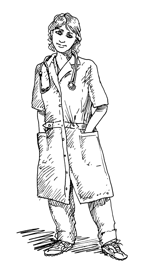
An excerpt from Leslie Jamison’s essay, The Empathy Exams, which appears in full in the February issue and on believermag.com
DISCUSSED: Inexplicable Seizures, An Ailing Plastic Baby, Teenagers in Ponchos, An Endless Supply of Mints, Another Word for Burning, Crippled Rabbits in Love, The Sad Half-Life of Arguments, A Kid’s Drawing of God, Praying in the Nook, Major Personality Clusters, fMRI Scans, Adam Smith, Pet Fears, Impulse’s Dowdier Cousin, A Broken Arrow, A Bottle of Rain
My job title is Medical Actor, which means I play sick. I get paid by the hour. Medical students guess my maladies. I’m called a Standardized Patient, which means I act toward the norms of my disorders. I’m standardized-lingo SP for short. I’m fluent in the symptoms of preeclampsia and asthma and appendicitis. I play a mom whose baby has blue lips.
Medical acting works like this: you get a script and a paper gown. You get $13.50 an hour. Our scripts are ten to twelve pages long. They outline what’s wrong with us—not just what hurts but how to express it. They tell us how much to give away, and when. We are supposed to unfurl the answers according to specific protocols. The scripts dig deep into our fictive lives: the ages of our children and the diseases of our parents, the names of our husbands’ real-estate and graphic-design firms, the amount of weight we’ve lost in the past year, the amount of alcohol we drink each week.
My specialty case is Stephanie Phillips, a twenty-three-year-old who suffers from something called conversion disorder. She is grieving the death of her brother, and her grief has sublimated into seizures. Her disorder is news to me. I didn’t know you could have a seizure from sadness. She’s not supposed to know either. She’s not supposed to think the seizures have anything to do with what she’s lost.
STEPHANIE PHILLIPS
Psychiatry
SP Training Materials
CASE SUMMARY:
You are a twenty-three-year-old female patient experiencing seizures with no identifiable neurological origin. You can’t remember your seizures but are told you froth at the mouth and yell obscenities. You can usually feel a seizure coming before it arrives. The seizures began two years ago, shortly after your older brother drowned in the river just south of the Bennington Avenue Bridge. He was swimming drunk after a football tailgate. You and he worked at the same mini-golf course. These days you don’t work at all. These days you don’t do much. You’re afraid of having a seizure in public. No doctor has been able to help you. Your brother’s name was Will.
MEDICATION HISTORY:
You are not taking any medications. You’ve never taken antidepressants. You’ve never thought...
You have reached your article limit
Sign up for a digital subscription and continue reading all new issues, plus our entire archives, for just $1.50/month.
Already a subscriber? Sign in




